Copyright ©2007 PopEntertainment.com. All rights reserved.
Posted:
July 27, 2007.
For gonzo British
director Danny Boyle (the guy who created such a generation-defining film as
Trainspotting and who redefined the zombie freak-out with 28 Days
Later), making a film like Sunshine required a different set of
muscles than used with his other films. The pace was more deliberate; the
characters couldn't be so overtly quirky. Yet the film still had to have his
visual pizzazz and cast of unique characters.
And the film had to
make some kind of sense to make it properly science fiction. So he chose to
create a world 50 years in the future so in panic to save itself from a
dying sun that it has sent two expeditions carrying massive world-shattering
bombs that are meant to re-ignite the sun. Though the first ship was lost,
the second hopes to make up for its failure and save humankind and the solar
system.
For such an ambitious
journey, Boyle applies his fascinating vision and unique style of
storytelling to keep us guessing while still fashioning an instant classic
of the spaceship drama genre.
Are the elements to
making a good science fiction film different from just a good film?
I've never heard that
one before. I guess the truth is they break down into three things, which is
a ship, a crew, a signal. They all break down into that at the moment, and
until we colonize space, I think they probably always will. There will
always be a steel tube with a group of individuals that represent us,
trapped inside of it. Then on their journey, something happens. It's a
signal, changes everything. It gives them a big problem, then they move or
not, or what do they do. And it's weird, when you look at them, so many of
them break down into those basic ingredients.
At the moment I think
that's probably what you need. It's a particular kind of sci-fi. There is
another kind of sci-fi, which is Star Wars, Star Trek which is
literally fantasy. Anything goes, you can do anything you want, really. But
[Sunshine is] the stricter kind of space sci-fi. It's basically still
predicated on what NASA is doing.
It imagines that
[they] eventually will be going this far.
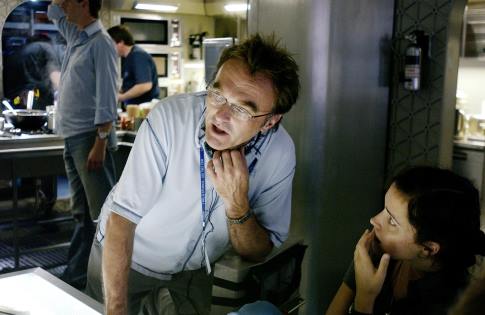 I'm a big science
fiction fan, so I saw
2001, and a lot of
films like that. You mentioned the limitations of the genre that you didn't
necessarily expect. Was that a great challenge for you?
I'm a big science
fiction fan, so I saw
2001, and a lot of
films like that. You mentioned the limitations of the genre that you didn't
necessarily expect. Was that a great challenge for you?
The relationship you
have with these films is constant. You try to forget about them as a
director when you get up and shoot the film. But the aura is there, hovering
around, and every direction you turn, they've been there already, they've
tried that. That's really frustrating, on the one hand.
And you realize quite
quickly how narrow it is. Much narrower, say, than the zombie tradition,
which you would think was a much more narrow, more specific, tradition. Not
at all. You're quite free to do anything you want in a zombie movie. Not so
in space. If you try certain things differently, they don't work because
they literally undermine the film. You have to go back to the original. It's
not like a risk moment, where you risk the film.
What were some of your
influences?
The great ones
[everyone knows] are a huge inspiration [like Alien, Blade Runner,
etc.]. You remember the first time you saw them and the effect they had on
you, the spell of them. What's interesting is that there's very little humor
in space. We tried to put a lot more jokes in. We managed to get a few jokes
in, courtesy of Chris Evans. He has a couple of moments.
Apart from that,
forget it. It's absolutely that bone dry like that. And you think why is
that? And of course, it's because its such a hostile place. Everything out
there is just poised to kill us, and we're protected by this little steel
tube. Everything is fragile. Everything is right on the edge. You've got to
take it very seriously.
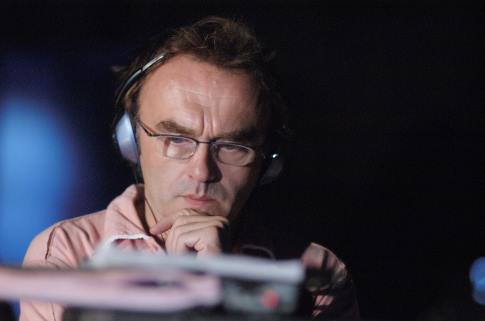 Why did you add in the
radiation-scarred insane mad-killer Pinbacker character?
Why did you add in the
radiation-scarred insane mad-killer Pinbacker character?
It's introducing him
into an otherwise realistically based film. Otherwise, it's an extreme
psychological element, really. In a way, he's a character. He's based on the
guy who piloted the first ship, who has had this transformation. But
actually, he's a psychological challenge to the sanity of the crew members,
who still exist when you meet him, if you like. That's the thing that's
always worked for me. And when you go to the surface of the sun as we
always used to say it's not a tea party. It can't be a debate. This isn't
a debate. This is the surface of the sun.
You have to represent
that in some way, and we represented that with Pinbacker, this guardian of
the gates of heaven or hell, whatever you want to call it. He stands there
as a guardian at the gateway. I wanted to depict him in a way that was as
extreme as I could do, which I could do technically, which is this blurring,
this stretching. I wanted him to feel that, literally, the protons and
neutrons that make him up had been reorganized somehow that he was no
longer recognizable as a human, except that he is still speaking with a
human voice and he is captain of the first ship.
This film is paced
and edited differently from other Danny Boyle films. Why was it paced much
slower than your other films? Was that important to you?
You can't do it any
other way. We tried. It's one of the disciplines of this kind of film: if
you want it quicker, you cannot believe they're in space. You do not believe
the journey. It's absolutely extraordinary. And we tried a love story. You
try all these things and they just don't work. As a director, you sit there
as if you're on the audience's behalf.
Early on in the
process, we just slowed it down. It's a risk, especially with modern day
films. I remember when [director] Ridley Scott said he didn't think that
Alien would work when he released it, because the first 45 minutes are
so slow before anything really happens. I don't think the film would work
unless you ran it at that pace. It's eternity, endlessness, isolation; all
the ways that you represent that. You have to take that risk.
You didn't think the
challenge of having a relationship happen between, say, Rose Byrne and
Cillian Murphy, would have worked as an interesting diversion or
distraction?
I liked their
relationship. I think they do have a relationship. But when we try to
physicalize it, in any other way, it was just like embarrassing. When we
tried to have them kiss, we had a great sex scene worked out in the garden.
It was a perfect place for them to have a great sex scene. It never, never
worked.
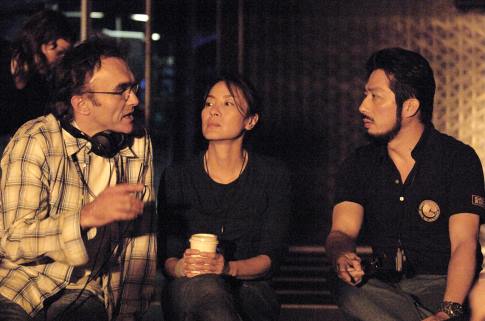 Casting is critical
to these films because of that sparse environment, you need a strong cast to
carry the film. And you really came up with a hell of a cast. [Hiroyuki]
Sanada and [Cliff Curtis] from The Whale Rider, and other people one
might not have expected. Chris Evans is another actor where we find out
there's a lot more to him than has been realized.
Casting is critical
to these films because of that sparse environment, you need a strong cast to
carry the film. And you really came up with a hell of a cast. [Hiroyuki]
Sanada and [Cliff Curtis] from The Whale Rider, and other people one
might not have expected. Chris Evans is another actor where we find out
there's a lot more to him than has been realized.
He's a fantastic
actor. He's very underrated, I think. I've got a very unusual perspective on
him. You know the way actors always bore on about people only knowing them
as one thing. And they're always moaning about success, you know, like
they're trapped in a successful franchise. But I saw it really from his
perspective this time. My impression of him was from his audition. Then
Fantastic Four came out, and I could see why other people wouldn't want
to cast him because Fantastic Four boxes him. But he was so much
more, really, and it was easy for me to cast him.
One of the great
things about these movies, one of the freedoms it does give you, is casting,
because they usually shoot ensembles. Stars on the whole tend to look out of
place in space with the exception of Tom Hanks, of course, in Apollo 13.
Obviously the first Alien film is a great example of it. Sigourney
Weaver emerged out of a pack and nobody knew who she was. So that gave us
the freedom to cast internationally, to cast favorite actors and get
together a good mix of people. Race and nationality are not important in
space. It's the only place where we've managed to make [it neutral] on
behalf of all mankind. So you can keep that, cast anyone you want, that's
not an issue.
Michelle Yeoh played
well together with the other characters.
What clicked about them?
We got them all to
live together, which I think helped them bond as a team. There was no
trouble with them at all. And normally, with a bunch of actors over two or
three months, you always get a little bit of tension. An affair goes wrong
or something. Nothing on this. It was really calm, peaceful. They were very
good, yeah.
The choices you see
here Hiro Sanada, who was a samurai.
I just wanted that
guy, the sacrifice thing. I wanted a Japanese captain. Finding him was
amazing. He made a film called Twilight Samurai, and it's a most
amazing film. His performance is amazing.
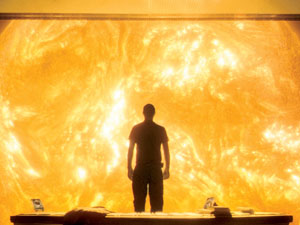 We're all hearing
about global warming, the effects of what's going to happen. But in your
film, it's the reverse. There's not enough sun, not enough warmth, and we
are a big ice ball here. Was that intentional?
We're all hearing
about global warming, the effects of what's going to happen. But in your
film, it's the reverse. There's not enough sun, not enough warmth, and we
are a big ice ball here. Was that intentional?
Yeah, when we started
like three years ago, you could see clearly the obsession of the world now
was going to be, quite rightly, on global warming or climate change, if
you want to call it that, because it manifests itself in very different ways
wherever you are on the planet. But we decided to look the other way. It's
counterintuitive if you just go, don't look that way, look that way. It's
still relevant, I think, because the film makes you look at our relationship
with the star and how precious and how fragile existence really is. It stops
it being a film about blaming ourselves as well. Because global warming, you
have to point the finger at us, really. And lots of people are doing that,
quite rightly.
Weren't you worried
about being called on the carpet for the very science of this, not because
the problem isn't the global warming? There really isn't any real indication
that our sun is cooling that quickly. For a star to cool that quickly it
would involve a cataclysm that would have destroyed everything anyhow. What
[was] the logic of it?
Well, what's
extraordinary about it is how little we've changed and how easy it would be
for it to change. It's extraordinary. You know why it gets colder in the
winter of this planet? I thought it was the tilt of this earth. You tilt
away for six months. It makes you cooler. It's not. It's just the fact that
there is less surface area of the planet exposed to the sun to absorb the
heat. So you don't heat up as quickly.
Is it the distance of
the orbit?
Nope, it's nothing to
do with that. It has to do with the tilt and the amount of surface area of
the planet that's actually exposed to the sun to warm it up. But there is
something, sadly, something could happen to the sun in the meantime, that
would affect our relationship with it. I don't think that we'd be able to do
anything about it. Certainly not now or within the next fifty years, it
looks unlikely. Something could happen. If it does, it's more likely to be a
magnetic pulse, which will just wipe out life on the planet. We won't be
able to do anything about that. But we've gotten through four and a half
billion years with it, so we should be okay.
Because you made it
a point of discussion about life on earth, you didn't want to contrast what
that world was like 50 years in the future. Did you make it a consideration?
No, we always wanted
to. There was a big discussion with the studio because I think that, in
conventional terms, you should really cut back. If you wanted to make it
more of a disaster movie, you'd cut back to earth and show children
freezing. But we didn't want to do that. We wanted to keep this one moment
to be just the end moment of the film, when you got back to work. We didn't
want the film to be made as a disaster film. We wanted it to be more a
psychological film about those people rather than a disaster movie partly
set on Earth.
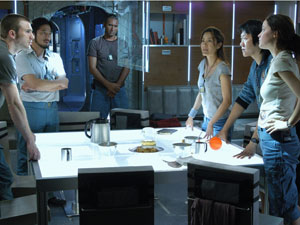 What didn't make the
final cut and will we see on the DVD?
What didn't make the
final cut and will we see on the DVD?
There's some good
stuff on the DVD. There's a different kind of ending. There's one different
ending, which there usually is with my stuff. There's a different strange
ending. There's a different ending in there we shall see which isn't,
effect-wise, completed, but you'll get the idea of it. And there's a few
scenes, not very many scenes actually, less cut scenes then I'd normally
have. There's lots of documentary bits and pieces about how we made it and
how it was done and all that, which I think really is interesting because it
takes you through the whole process of how you make a film like this.
I have my own
alternative ending; he comes back to Earth and finds that the Earth is
already destroyed.
So there is an
alternative ending.
Will you do a
commentary?
I've done a
commentary.
Will the writer too?
Alex hasn't done one.
Brian Cox has done one, the science advisor. So he's done one on the science
point of view.
I loved the score. Can
you explain about that sound?
I work with this band,
Underworld, and I had this idea right from the beginning that they would do
a pass across the whole film. I said they could do whatever they wanted. It
wasn't prescriptive. I just wanted them to watch the film, experience the
film, and basically jam to the film. And they did that. It took the pressure
away from them as to should they be conventional composers. They just did
it. And I gave it to John Murphy, who is my regular composer, and he shaped
it into the more professional score. And I'm very impressed with the score.
I think it's really original and different. It's one of the moments that we
managed to do something our own way.
Are you surprised with
how this film has been doing in Europe?
I was a bit
disappointed, to be absolutely honest. It did do well in Australia I think
because of Rose, actually, who's becoming quite a star. The biggest surprise
for me was Britain. They blamed it on the weather. It was a really hot
weekend that week and the following weekend. It did nothing well, not
nothing, not horribly, really. But it wasn't what I was expecting at all.
It's disappointing, but you can't let that kind of stuff affect you. You
have to plow on. I learned that. You have highs and lows, in terms of box
office. Later on, they don't mean anything.
I remember the
reception in Britain for 28 Days Later. Even though the box office
was high, the critical reception was really negative. People regard it as a
trash genre film that I shouldn't be doing. But in America, where it was
looked at properly, people all started changing their minds. So you keep
your own perspective on things.
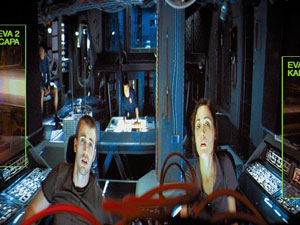 Do you think that
has to do with how intelligent science fiction is received nowadays versus
big-budgeted action films?
Do you think that
has to do with how intelligent science fiction is received nowadays versus
big-budgeted action films?
It's certainly a
particular kind. It certainly requires patience, like the pacing in the
beginning. We tried constantly to make it intelligent, and I don't apologize
for that. Fortunately, we didn't make it for 150 million dollars. It still
will make its money back very reasonably.
Any more sci-fi films
in the making?
The [next film] is
called Slumdog Millionaire. It's written by Simon Beaufoy, who wrote
The Full Monty" Wonderful writer. He's based it on a true story of a
guy, slum kid, uneducated, and who goes on the Hindi version of Who Wants
To Be A Millionaire, and he wins it. Now the Hindi version of Who
Wants To Be A Millionaire isn't like here or in Britain; it's really
tough. In India, they have this whole class of really educated people but
they don't have much money. But they're professors. They all target the
show. It's a lot of money. It's not like they win a million rupees. They
actually win a million dollars, which in Indian terms is like 50 million
dollars.
So this slum kid goes
on it and wins it, and the film's structures shows how he knows the answers
to all the questions. But the real reason he's on the show isn't to win the
money, it's to get back into touch with his girlfriend who he lost and she's
a slum kid too. So they don't have mobile phones or anything like that. All
he knows is that she watches Who Wants To Be A Millionaire
religiously.
Whatever happened to
that film
Alien Love Triangle?
Well, the Weinstein
Brothers are taking it to their new company and they've got it. It's
amazing. It cost $2 million. Not a negligible investment.
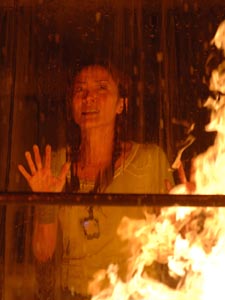 Will they put it out
on DVD eventually?
Will they put it out
on DVD eventually?
We were hoping to have
it come as a charity DVD. I think they're hoping I will complete it, or
we'll do a film together and I'll put it on the DVD. It's really nice, and
got lovely performances from the three of them Kenneth Branagh, Courtney
Cox, and Heather Graham as an alien.
What makes a good
Danny Boyle film story?
I like extremes. I'll
do anything. I'll risk everything to get that extremity. I am aware of that.
I remember when we did Trainspotting. There's a sequence in it where
he goes down the toilet. People now speak of that scene with great love.
People really love that sequence. I remember when we were planning it,
people said, "That's not going to work. People won't believe it. You're
jeopardizing the whole film." But I always do those things anyway.
There's a sequence in
The Beach where he turns into a cartoon character and people would
say exactly the same, and they were right [laughs] because I think a
lot of people just went "oh, no" and they couldn't take that at all.
But you've got to stay
committed to those extremities. I think people don't go to the cinema to see
timidity. You've got to see boldness. The risk taking is everything. Even if
you destroy the film in the process, that's what it always is to me.
CLICK HERE TO SEE WHAT DANNY BOYLE HAD TO SAY TO US
IN 2008!
Email
us Let us
know what you
think.
Features
Return to the features page.